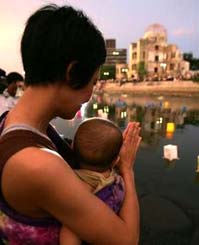1000 Peace Doves over Hiroshima

People all over the world marked August 6th, 2005, the 60th anniversary of the first atomic bombing of Japan, by rekindling a world-wide push to abolish all nuclear weapons. From Germany and India, to Australia and England - hundreds of thousands held demonstrations and commemorations that called for the dismantling of atomic arsenals. Americans in New York City drew chalk outlines on sidewalks to symbolized the hundreds of thousands of Japanese civilians who were incinerated in the nuclear bombings, and at Seal Beach, California, protestors gathered at the naval facility where nuclear weapons are stored. In actions large and small, reported and unreported - millions expressed their desire to see a world free of weapons of mass destruction. In Japan, at precisely 8:15 in the morning, the moment the bomb burst over Hiroshima 60 years ago, the city's trolleys stopped, while over 55,000 people gathered in Hiroshima's Peace Memorial Park to pray for the dead and a peaceful future. A moment of silence was held for the thousands who perished - a silence that was broken with the release of 1,000 white doves and the ringing of a bronze bell.
Tens of thousands of hand-folded paper cranes symbolizing peace, long life and health, were left on and around the simple arch-shaped stone monument that stands at the center of the park. Flowers and wreaths were placed around the monument, and hundreds brought ladles of water - symbolizing the tens of thousands who perished sixty years ago while pleading for water. Accounts from those fateful days tell of parched survivors of the atomic inferno begging for water - only to drop dead after their first sip. Outside of the only building to withstand the atomic blast, the famous A-Bomb Dome of Hiroshima, hundreds of peace activists fell to the ground to conduct a die-in that would dramatize their demand for the abolishment of nuclear weapons. Hundreds of others staged a march to demand the removal of Japanse troops from occupied Iraq. As the sun set, many thousands of small paper lantern boats were released onto the river next to the Peace Park. Each lantern held a candle, and symbolized the soul of someone who died in the atomic fire.
Hiroshima's Mayor, Tadatoshi Akiba, read a Peace Declaration for the abolishment of nuclear weapons, and criticized the United States, Russia and all the other nations possessing atomic bombs for "jeopardizing human survival." The Mayor said that "Within the United Nations, nuclear club members use their veto power to override the global majority and pursue their selfish objectives." A statement by UN Secretary General Kofi Annan, was read to the crowd at Peace Park by Nobuyasu Abe, the UN undersecretary for disarmament. Annan warned against the "cascade of nuclear proliferation" now taking place across the world. He said "we are witnessing continued efforts to strengthen and modernize nuclear arsenals", a clear swipe at the Bush administration, which is involved in developing a new class of battlefield nuclear weapons. Annan went on to say, "Today we are all hibakusha (atom bomb survivors). No nuclear weapon has been used again, and progress has been made in reducing such weapons and preventing the proliferations. But we still live in a world where tens of thousands of nuclear weapons remain - many of them on hair-trigger alert."


<< Home